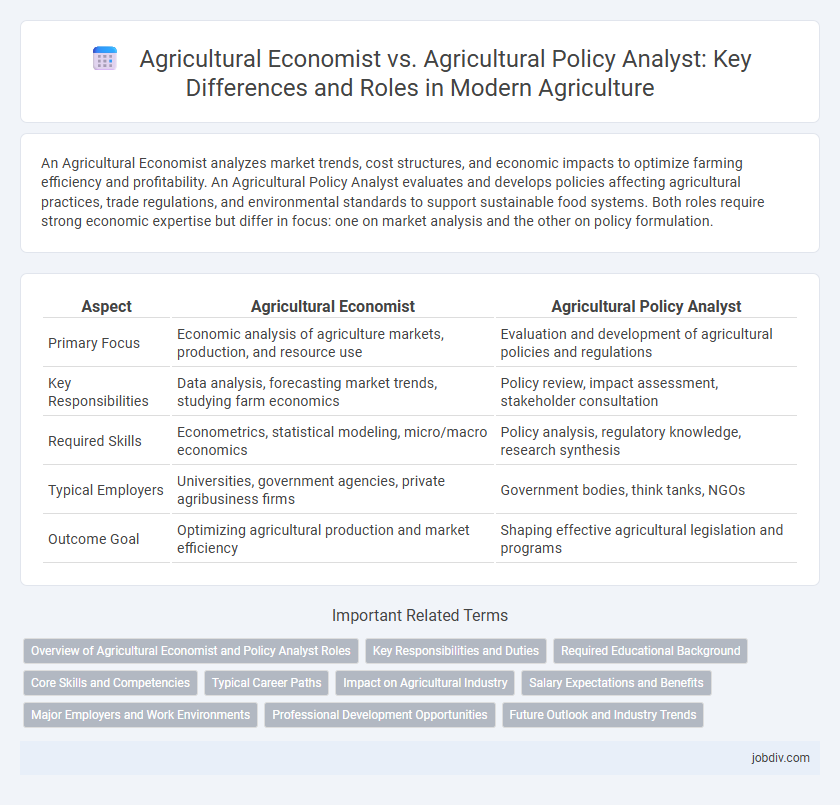An Agricultural Economist analyzes market trends, cost structures, and economic impacts to optimize farming efficiency and profitability. An Agricultural Policy Analyst evaluates and develops policies affecting agricultural practices, trade regulations, and environmental standards to support sustainable food systems. Both roles require strong economic expertise but differ in focus: one on market analysis and the other on policy formulation.
Table of Comparison
| Aspect | Agricultural Economist | Agricultural Policy Analyst |
|---|---|---|
| Primary Focus | Economic analysis of agriculture markets, production, and resource use | Evaluation and development of agricultural policies and regulations |
| Key Responsibilities | Data analysis, forecasting market trends, studying farm economics | Policy review, impact assessment, stakeholder consultation |
| Required Skills | Econometrics, statistical modeling, micro/macro economics | Policy analysis, regulatory knowledge, research synthesis |
| Typical Employers | Universities, government agencies, private agribusiness firms | Government bodies, think tanks, NGOs |
| Outcome Goal | Optimizing agricultural production and market efficiency | Shaping effective agricultural legislation and programs |
Overview of Agricultural Economist and Policy Analyst Roles
Agricultural Economists analyze economic data to improve farming efficiency, market strategies, and resource management, using quantitative models to forecast trends and guide investment decisions. Agricultural Policy Analysts evaluate government policies, regulatory frameworks, and socio-economic impacts affecting agriculture, providing recommendations to optimize food security and sustainable development. Both roles require strong expertise in economics, data analysis, and knowledge of agricultural systems, but economists focus more on market dynamics while policy analysts emphasize legislative and programmatic evaluations.
Key Responsibilities and Duties
Agricultural Economists analyze market trends, production costs, and economic impacts to improve agricultural efficiency and profitability. Agricultural Policy Analysts evaluate government policies, regulatory frameworks, and their effects on agriculture, advising on policy development and implementation. Both roles require expertise in data analysis, economic modeling, and understanding of agricultural systems, with Economists focusing on economic optimization and Policy Analysts prioritizing legislative and policy assessment.
Required Educational Background
Agricultural economists typically require a bachelor's degree in agricultural economics, economics, or a related field, with many positions favoring a master's or doctoral degree for advanced research roles. Agricultural policy analysts often hold degrees in public policy, economics, or agricultural science, emphasizing education in policy analysis, economics, and regulatory frameworks. Both careers benefit from coursework in statistics, environmental science, and agricultural systems, but the focus diverges towards economic theory for economists and policy formulation for analysts.
Core Skills and Competencies
Agricultural Economists excel in quantitative data analysis, economic modeling, and forecasting market trends to optimize farm productivity and resource allocation. Agricultural Policy Analysts focus on regulatory frameworks, policy evaluation, and stakeholder communication to develop sustainable agricultural policies. Both roles require strong analytical skills, expertise in agricultural systems, and proficiency with statistical software such as Stata or R.
Typical Career Paths
Agricultural economists typically follow career paths in research institutions, government agencies, and agribusiness firms where they analyze market trends, pricing, and resource allocation. Agricultural policy analysts tend to work within government departments, think tanks, and advocacy groups, focusing on the development, evaluation, and implementation of policies affecting food production and rural development. Both career trajectories often involve advanced degrees in economics, agricultural science, or public policy to enhance expertise in data analysis and regulatory frameworks.
Impact on Agricultural Industry
Agricultural Economists analyze market trends, resource allocation, and economic impacts to optimize farm productivity and profitability, directly influencing industry efficiency. Agricultural Policy Analysts evaluate government regulations, subsidies, and trade policies to shape frameworks that support sustainable agriculture and rural development. Both roles are crucial in driving economic stability and growth within the agricultural sector through data-driven decision-making and policy guidance.
Salary Expectations and Benefits
Agricultural Economists earn an average salary ranging from $60,000 to $100,000 annually, reflecting their expertise in economic analysis and market trends within the agriculture sector. Agricultural Policy Analysts typically receive salaries between $55,000 and $90,000, with benefits often including health insurance, retirement plans, and opportunities for government or nonprofit sector employment. Both roles offer potential bonuses and professional development benefits, though Agricultural Economists may command higher pay due to their specialized economic modeling skills.
Major Employers and Work Environments
Agricultural Economists are commonly employed by government agencies, research institutions, and universities where they analyze market trends and economic data to inform farming practices and agricultural development. Agricultural Policy Analysts typically work within government bodies, advocacy groups, and think tanks, focusing on evaluating and designing policies that impact food production, resource management, and rural economies. Both roles often operate in office settings, though fieldwork and collaboration with farmers and stakeholders are integral to understanding practical applications and policy effects.
Professional Development Opportunities
Agricultural Economists can enhance their expertise through advanced degrees in economics or agribusiness, along with certifications in data analysis and forecasting methods, enabling roles in market research and financial planning. Agricultural Policy Analysts benefit from specialized training in public policy, regulatory affairs, and environmental sustainability, often pursuing master's degrees or certifications in policy analysis to influence legislative frameworks. Both professions have opportunities in government agencies, research institutions, and international organizations focused on agricultural development and food security.
Future Outlook and Industry Trends
Agricultural Economists are poised to benefit from increasing demand for data-driven insights on sustainable farming practices and global food supply chain optimization, leveraging advancements in econometric modeling and big data analytics. Agricultural Policy Analysts will see growing opportunities as governments and organizations prioritize climate resilience, food security, and regulatory frameworks to address environmental challenges and trade dynamics. Both roles will evolve with the integration of technology such as precision agriculture and AI, shaping policies and economic strategies in the agriculture sector.
Agricultural Economist vs Agricultural Policy Analyst Infographic

 jobdiv.com
jobdiv.com